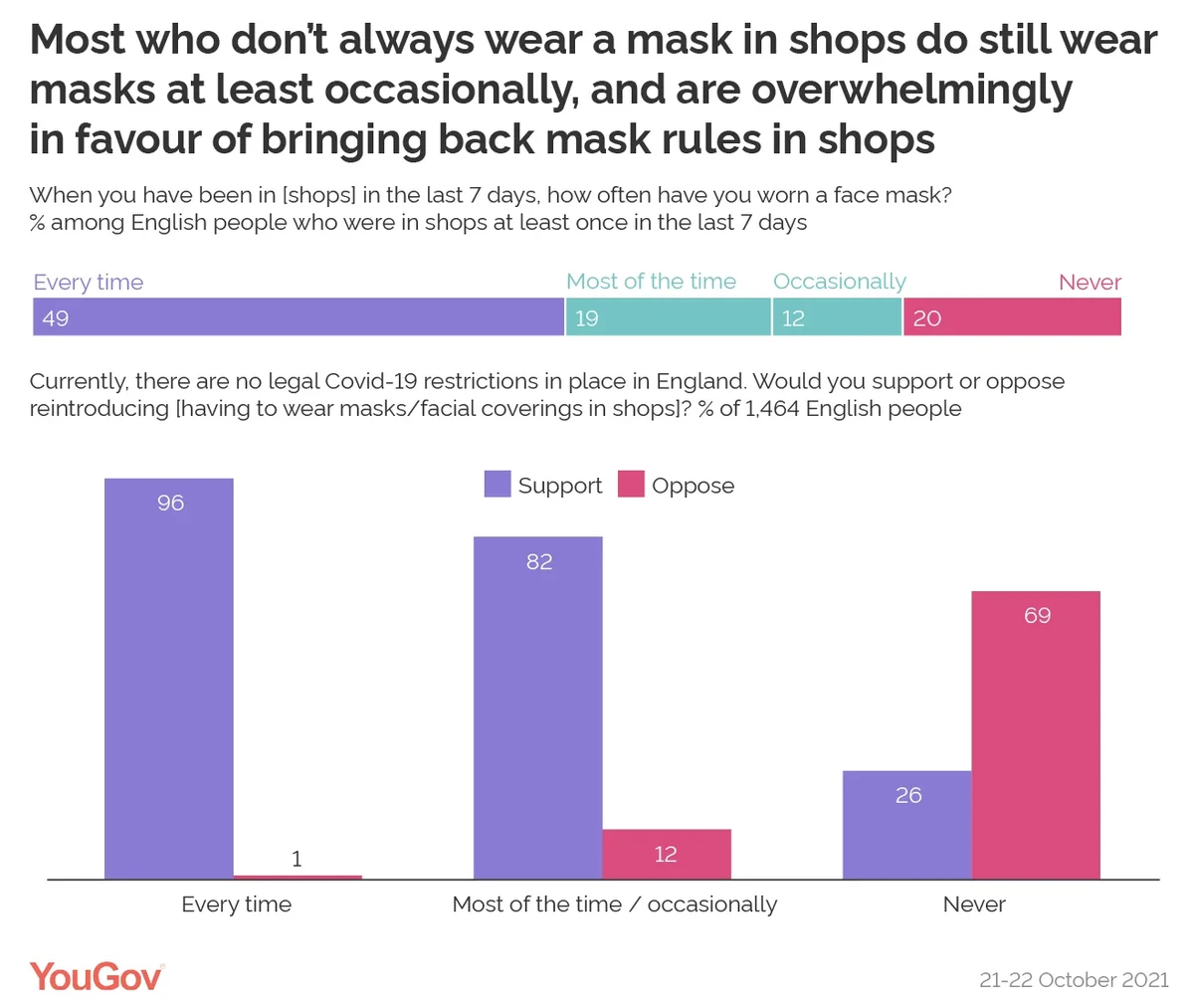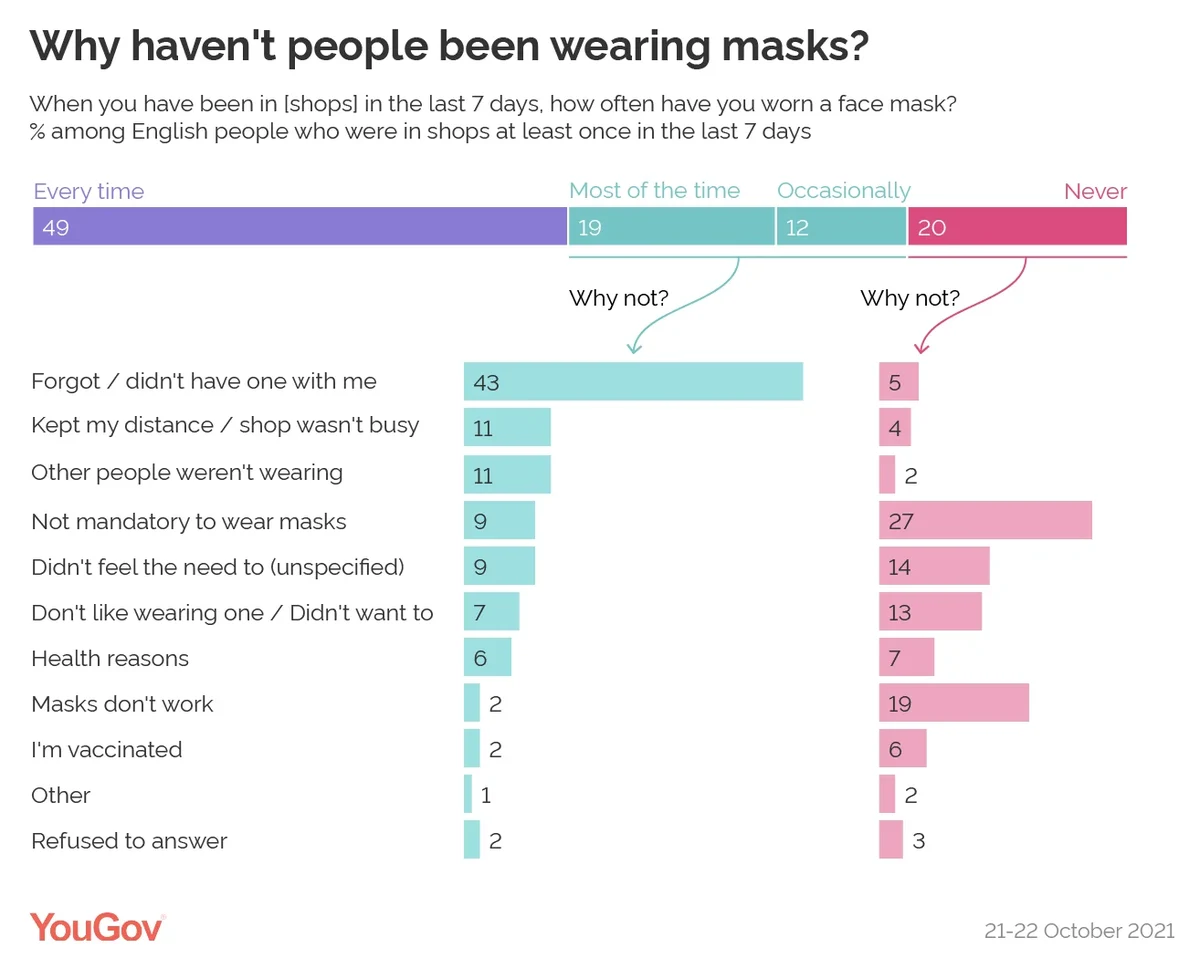While the government remain reluctant to introduce ‘Plan B’ measures in England this winter, we may see the return of compulsory masks in shops and public transport. YouGov polling last week found that the public would be receptive to such a change, with 76% of people in England saying they would support a policy enforcing masks being worn in shops.
Yet when we ask about actual mask wearing, we find that, for instance, only half (49%) of English people who went to a shop in the preceding week say they wore a mask on every occasion. There is clearly a gulf between desire for policy change and personal action.
So why is there such a difference? And is it likely that people can be encouraged to put their masks back on?
The first place to look is at the frequency of mask wearing. While 51% of the public did not wear a mask every time they visited a shop, just 20% never did so.
Most of this group is in fact made up of shoppers who wore a mask either most of the times they went out (19%) or occasionally (12%). Therefore the majority of those who are seen not wearing masks while shopping haven’t abandoned the concept completely, as they do at least sometimes wear one.
This group are also much closer in their views on mandatory mask wearing to those who wore one every time they went shopping than those who never did.
Almost everyone who wore a mask without fail when they went shopping (96%) supports bringing back the requirement to wear masks in shops, as do 82% of those who wore a mask on some shopping visits. By contrast, just 26% of those who didn’t wear a mask at all in the week prior support reintroducing the rule, with 69% opposed.

Why aren’t Britons wearing face masks?
Asking those who didn’t always wear a mask on every shop visit to tell us – in their own words, why they didn’t reveals key differences in attitude depending on whether the person supports or opposes the re-introduction of masks.
Amongst those who support bringing back masks, the main reason given for not wearing one is that they had forgotten it or didn’t have one with them at the time (43%). Other top reasons provided by this group were because others weren’t wearing one (11%), or they felt they were able to keep their distance from others instead (11%).
None of these three reasons indicate that this group would refuse to wear masks on every shop visit were it to become compulsory again. In fact, it largely suggests that people have just become more relaxed about their mask wearing.
"The harder group to convince are those who did not wear a mask at all in the last seven days and oppose the policy. The most common answer for not wearing a mask amongst these people is because it is no longer mandatory (27%), suggesting that were there a rule change they may start wearing again (albeit begrudgingly). The next most common reasons imply stronger anti-mask sentiment, however, including because masks don’t work (19%), they don’t like wearing them (13%) or general comments suggesting that they do not feel the need to (14%).

All of this suggests that a great deal of people would return to always wearing masks should the government tell them they have to once again.
Historical precedent suggests the same. Back in July 2020, prior to masks becoming compulsory, YouGov saw a similar gap between support and personal action. Just before the rule change only 38% were wearing masks, despite 80% supporting a policy to make it compulsory in shops. By the second week of August (just a few weeks after the rule change) mask wearing had risen to 75%.
A YouGov survey conducted just prior to the rules change had, as with this month’s study, suggested that the reasons for not wearing masks were soft, rather than a hard opposition to them in principle.
The government still says it “expects and recommends” people continue wearing face masks indoors. Many social problems are complex, expensive and difficult to solve. For the most part, mask compliance is none of these. The evidence strongly suggests that, if it wants more people to wear masks, the best thing the government can do is simply tell them to.
See full results here







